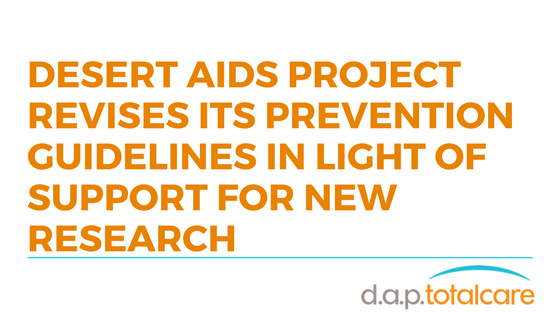For Immediate Release
April 25, 2017
Contact: Tom Tarr, Director of Client Development
Tel: 760-656-8460
Email: [email protected]
Desert AIDS Project revises its prevention guidelines in light of support for new research
Desert AIDS Project joins other national HIV prevention organizations by embracing a recent policy statement of the National Association of State and Territorial AIDS Directors (NASTAD). That policy titled, “Risk of Sexual Transmission of HIV from Virally Suppressed People Living with HIV” affirms the related scientific evidence and aligns prevention policy with that of many in the public health community.
“Recent research has shown that treating people with HIV and helping them maintain an undetectable viral load (less than 200 copies/ml) prevents the sexual transmission of HIV,” said Bruce Weiss, Director of Community Health at D.A.P. “The studies demonstrated no new transmissions occurred when the HIV positive partner was virally suppressed. This provides an additional prevention strategy for HIV-positive persons and their sexual partners which can also help end new HIV infections.”
In light of this new research, D.A.P. now recommends the following to prevent new HIV infections:
- 1. Commitment to ongoing treatment for HIV – ongoing treatment for individuals with HIV is vital to the success of this prevention strategy
- 2. Regular healthcare and viral load testing – staying healthy and regular testing is necessary for individuals utilizing this prevention strategy
- 3. Steps need to be taken to prevent Sexually Transmitted Infection (STI)
- Because of rising STI rates in the Coachella Valley, D.A.P. recommends that individuals having sex with more than one partner continue to use condoms. Condoms are the only proven strategy to help prevent new infections of STIs such as Syphilis, Gonorrhea and Chlamydia.
- Regular STI testing is also recommended at least every three months for those having sex with multiple partners, in order to detect infections early and ensure proper treatment.
“We’re excited about the confirmation of effectiveness that the research provides and the prevention community has embraced,” said David Morris, MD, Medical Director at D.A.P. “But to be effective, it’s important that people commit to taking their medicine as directed, as well as seeing a healthcare professional for regular monitoring and care. Without this commitment, this prevention strategy becomes ineffective.”
“It is important to increase awareness of this prevention strategy,” said Karen Mark, MD, Ph.D., Chief of the Office of AIDS in the Center for Infectious Diseases at the California Department of Public Health. “We’ve made great strides in our efforts to prevent new HIV infections. This strategy can play a key role in ending or reducing HIV-related stigma and allow partners to select prevention methods that work best for their relationships.”
For more information about D.A.P.s policy, the NASTAD position, and related research, please visit these pages:
NASTAD Policy: Risk of Sexual Transmission of HIV from Virally Suppressed People Living with HIV
PARTNER Study: How to Interpret the Zero Transmission Results
HPTN 052: Study Summary
About Desert AIDS Project
Desert AIDS Project (D.A.P.) is a Federally Qualified Health Center in Palm Springs, CA offering D.A.P. Total Care – a combination of medical, dental, counseling, social services, support groups, alternative therapies, in-house pharmacy and lab, and other health and wellness services. D.A.P.’s sexual health clinic, The DOCK, offers STD testing and treatment, Pre-Exposure Prophylaxis (PrEP), Post-Exposure Prophylaxis (PEP), and free HIV and HCV testing. D.A.P.’s Get Tested Coachella Valley campaign, the nation’s first region-wide HIV testing and access to care initiative, was recognized by the White House for helping to bring about an AIDS-free future. D.A.P. is rated a “Top 20 HIV Charity” by About.com. Visit www.desertaidsproject.org, www.thedockclinic.org, and www.gettestedcoachellavalley.org to learn more.
# # #
Printable version: Desert AIDS Project Press statement Viral Suppression Prevention Strategy 04.25.2017









